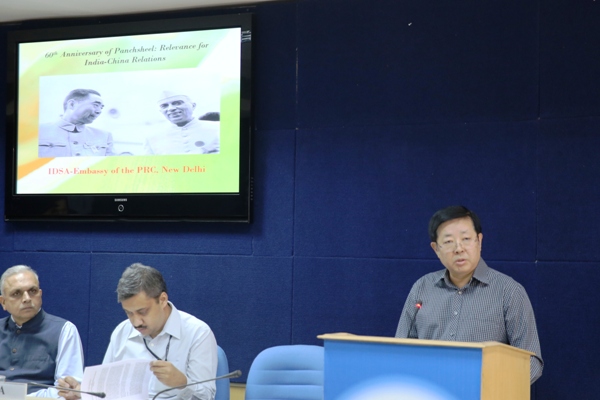|
11 June, 2014
IDSA, NEW DELHI

Distinguished Mr. Arvind Gupta, Director General of IDSA,
Experts, Scholars, Friends,
Ladies and gentlemen,
Namaste!
This year marks the 60th Anniversary of the Five Principles of Peaceful Co-existence, or Panchasheel. It is a pleasure for the Chinese Embassy to co-host this seminar with IDSA. Thanks for your hard work and good arrangement. I would also like to extend my gratitude to Mr. Shilpak Ambule, Director of East Asia Division, MEA and former ambassadors, experts and scholars from IDSA and China for your presence.
Sixty years ago, during Chinese Premier Zhou Enlai's visits to India and Myanmar, he along with Prime Minister Jawaharlal Nehru of India, and Prime Minister U Nu of Myanmar, issued joint statements and initiated the Five Principles of Peaceful Co-existence. Since then, thanks to the efforts by the three countries, these principles have been recognized and accepted by more and more countries, and written into many important international documents, thus become fundamentals of international law, widely adopted by the international community. For decades, these principles have significantly contributed to peace, stability and development in Asia and the world at large.
--They have helped countries to safeguard sovereignty and territorial integrity, which serve the fundamental interests of people all over the world.
--They have provided basic guidelines for countries with various social systems to establish and develop relations.
--They have inspired methodology to handle problems left over by history and to settle international disputes by peaceful means.
--They have safeguarded the interests of developing nations, and promoted improvement and development of north-south relations.
--They also have laid theoretical foundation for more fair and reasonable international order.
Today, we are living in a very different world from that of six decades ago, but the Five Principles of Peaceful Co-existence are still relevant. We should continue to uphold, at the same time to further enrich and develop these principles.
--We should follow these principles when conducting diplomacy. We should unswervingly stick to our independent foreign policies, uphold the spirit of non-alignment, and work for a new international order that is more just and reasonable.
--We should firmly support equal sovereignty among all states. The right of all nations to choose their own social system and path of development should be respected and protected. No countries should interfere in other's internal affairs on the pretext of human rights or humanitarian protection.
--We should actively seek common development. We should stick to the path of peaceful development and common development, in line with the spirit of equality, mutual benefit, cooperation, and win-win for all. We should respect each other's rights to make independent economic decisions, advocate a mutually beneficial global trade and economic regime, and oppose protectionism in any forms. In the economic field, we should make efforts to achieve peaceful co-existence, equal participation, competition on an equal footing, and win-win for all.
--We should promote New Security Concept, featuring mutual trust, mutual benefit, equality and coordination. As President Xi Jinping of China proposed in the recent Summit of the Conference on Interaction and Confidence Building Measures in Asia (CICA), it is necessary to advocate common, comprehensive, cooperative and sustainable security in Asia. Differences and disputes among countries shall be resolved through dialogue and consultation, instead of use or threat of force.
--We should fully respect diversity in the world. Different civilizations, cultures and religions should strengthen dialogues, seek common ground while shielding differences, accommodate and co-exist with one another in harmony. Nations, having different political systems or in different developing stages, should respect and learn from each other. No countries should impose its ideology or development model on other countries.
Last but not least, we should push the world towards the direction of multi-polarization. Developing countries should have more representation in international affairs, and international rules should be made through equal and collective consultations. The UN, G20, SCO, BRICS and other multinational regimes should get full scope for the role they play, with a view to make international governance more just and reasonable.
Friends,
China, India and Myanmar are neighbors connected by common mountains and rivers. We have similar history, in which we were all victims of colonialism and imperialism. And today, we share the common task to develop economy, and enable our people to have more decent lives.
Last year, during his visits to Central Asia and Southeast Asia, President Xi Jinping made two important initiatives of building the Silk Road Economic Belt and the 21st Century Maritime Silk Road. The purpose is to infuse new vigor to the ancient Silk Road, and add two powerful wings to the rejuvenation of Asia as a whole.
Currently, we are working hard for a BCIM Economic Corridor. Once finished, it will substantially increase connectivity among China, India, Myanmar and Bangladesh, greatly promote trade, investment and people-to-people exchanges, and encourage industrial and market integration. It will contribute significantly to peace and prosperity in this region. I would like to say, the BCIM Economic Corridor is a concrete example of implementing the Five Principles of Peaceful Co-existence in contemporary time. We would like to work jointly with other three countries, to build and finish the corridor at an early time, in order to benefit all people in this region.
Friends,
President Xi Jinping described how precious peace is in his recent public address. He said, "History has already shown us, that war is like demon or nightmare, inflicting endless suffers and pains to people. We must stay highly alert about it. While peace is like air and sunshine, blessing people without being noticed, but once lost, people can never survive." We gather here today and commemorate the 60th Anniversary of the Five Principles of Peaceful Co-existence to develop and enrich these principles, so that they could continuously make contributions to the great cause of world peace and development. I wish this Seminar a success.
Thank you!
Dhanyavad!
|